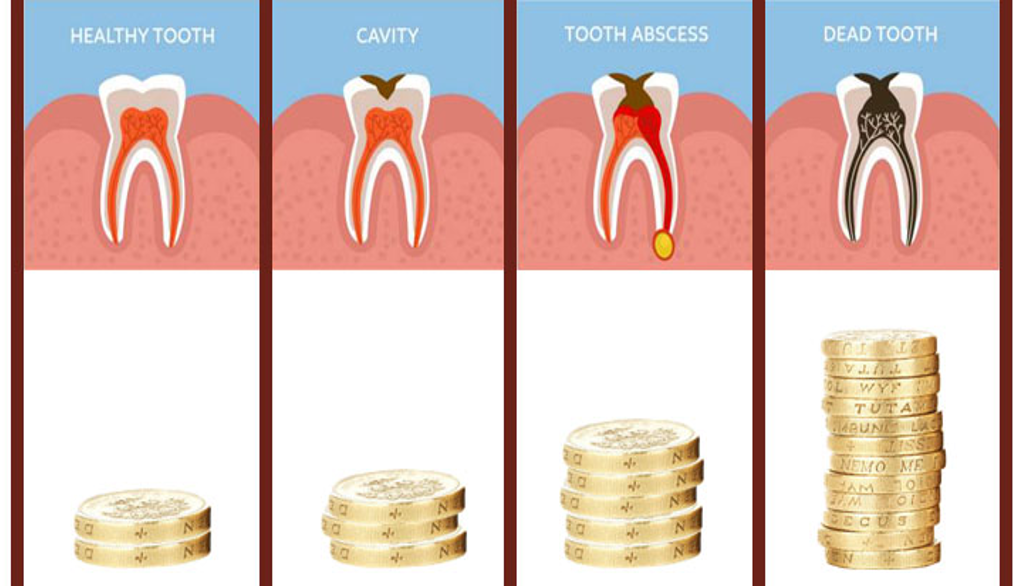
Root Canal Treatment
What is root canal treatment?
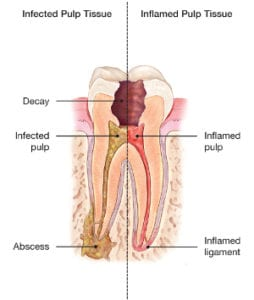
There’s no need to be worried if your dentist or endodontist prescribes a root canal procedure to treat a damaged or diseased tooth. Millions of teeth are treated and saved this way each year, relieving pain and making teeth healthy again.
Our tooth has 2 portions – the crown that you see in your mouth and roots that are present in your jaw bone. The roots have canals filled with nerves and blood vessels that take nutrition from your jaw arteries to the tooth pulp.
The tooth pulp is the innermost layer of nerves and blood vessels that makes the tooth a “living” thing. Bacteria from decay or tooth fracture or even gum infections can infect this pulp. This results in pulp inflammation and even necrosis. This causes pain, swelling in most cases or non-painful discoloration of teeth in others. This results in tooth destruction and tooth loss. In such cases, there is even risk of the infection spreading to the bone.
Thus, to save the tooth and make it healthy and pain-free; root canal treatment is done. Let us learn more about this quick, comfortable procedure that can relieve your pain and save your natural tooth.
What happens during root canal treatment?

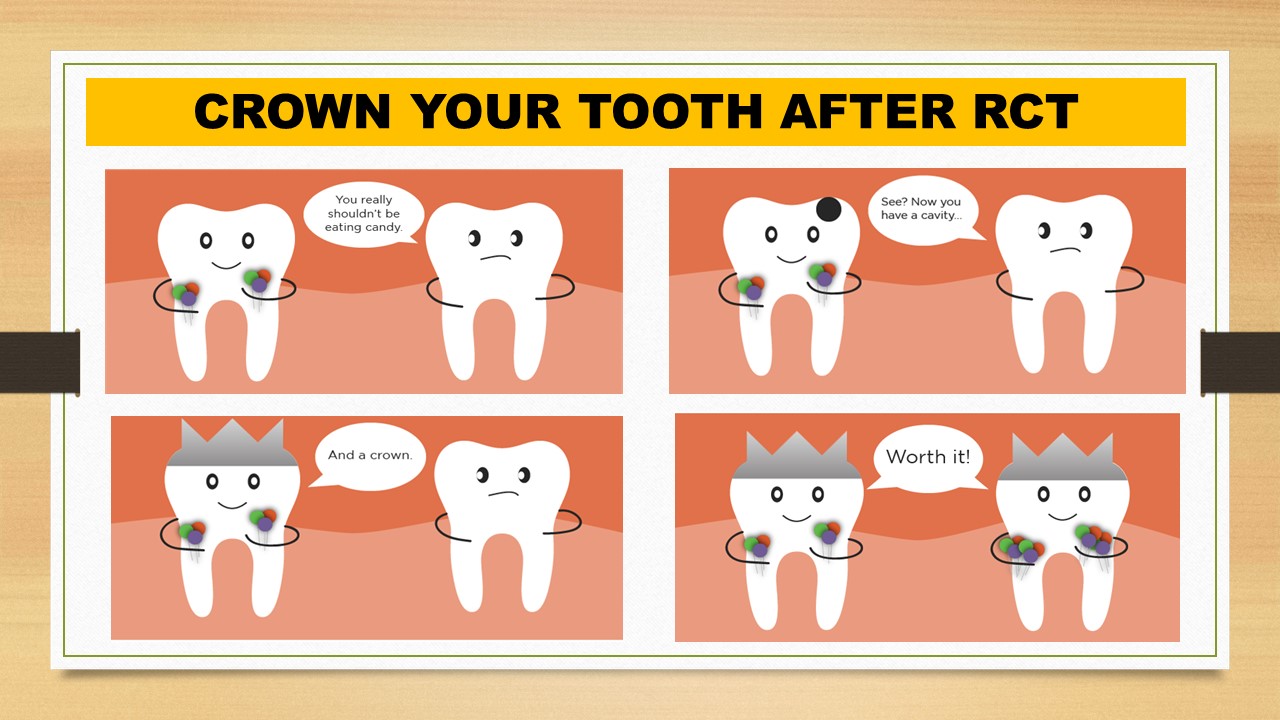

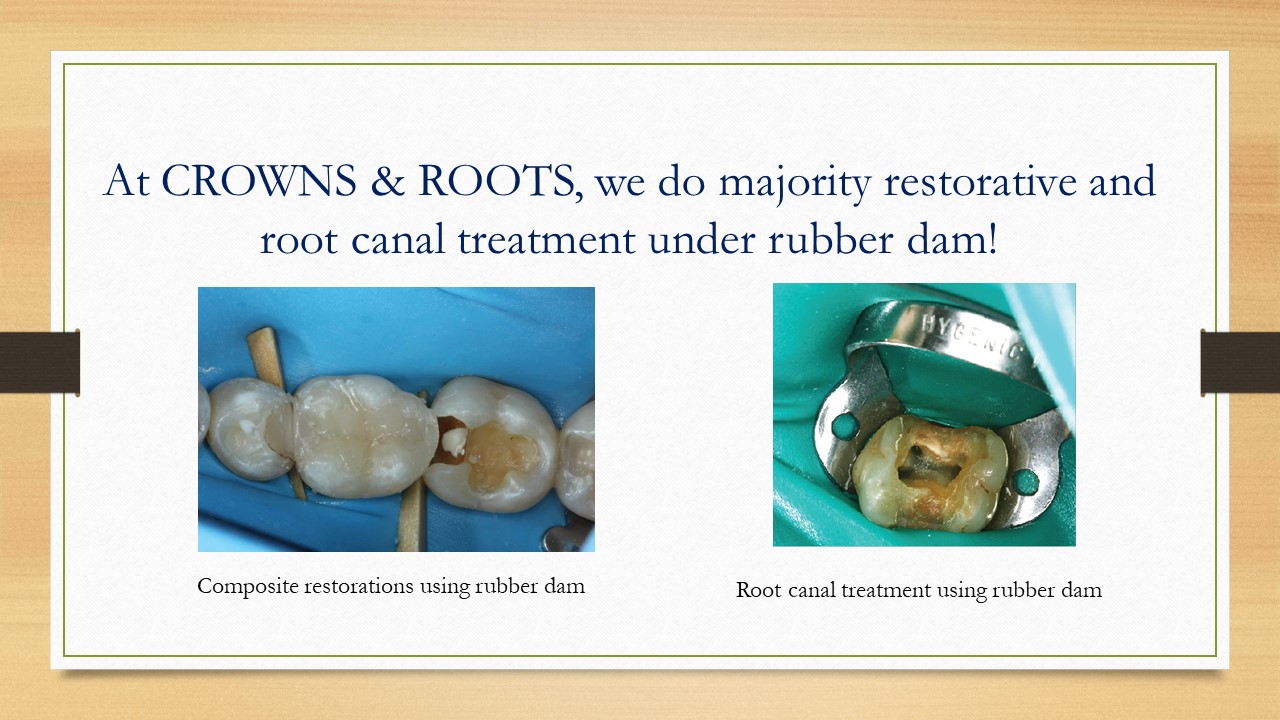
A modern root canal treatment is nothing like those old sayings! It’s very similar to a routine filling and can usually be completed in one or two appointments, depending on the condition of your tooth and your personal circumstances. Getting a root canal treatment done is relatively painless and extremely effective. You’ll be back to smiling, biting and chewing with ease in no time.
In this treatment, the decay is removed. Access is made to pulp cavity, where the infected and necrosed pulp is removed. From there, the root canals are then cleaned and disinfected using rotary instruments and chemicals. In some cases, where infection has spread to bone, medications are pumped into the bone via the root canals. Once the pulp chamber and root canals are sterile and bony infection is eliminated, the root canal and pulp space is filled with a sterile biocompatible material called gutta percha.
After this, the decayed portion of the tooth is built up using composite and a dental crown is placed over the tooth to protect it so it can be used again for chewing.
Gone are the days of 4-7 sittings to get a root canal done! At Crowns & Roots dental clinic, we do 80% of our root canals in a single sitting. They are done using loupes or our Dental Operating Microscope, to make the procedure quick and precise. A rubber dam is used in most cases to make you comfortable, and to prevent icky disinfectant chemicals from entering your mouth! With relaxing music playing , many of our patients doze off during this painless procedure!
Dr Janhavi Naik is herself a Root Canal Specialist (Endodontist) from the no 1 Nair Dental College, Mumbai with an experience of more than 5000 successful root canal cases! She also specializes in correcting incorrectly done root canal cases by others (re-root canal treatment).
Why should I go for root canal and not simply extract my painful tooth?
Saving the natural tooth with root canal treatment has many advantages:
How do I know I need a root canal?
Root canals are needed for a cracked tooth from injury or genetics, a deep cavity, or issues from a previous filling. Patients generally need a root canal when they notice their teeth are sensitive, particularly to hot and cold sensations. But it is the dentist who will provide a final diagnosis, by a thorough dental check-up and X rays.
There are a few symptoms that mean you might need a root canal—
Does a root canal hurt?
Since patients are given anesthesia, a root canal procedure is quite pain free. However, a root canal is generally a bit sore or numb after the procedure, and can even cause mild discomfort for a few days.
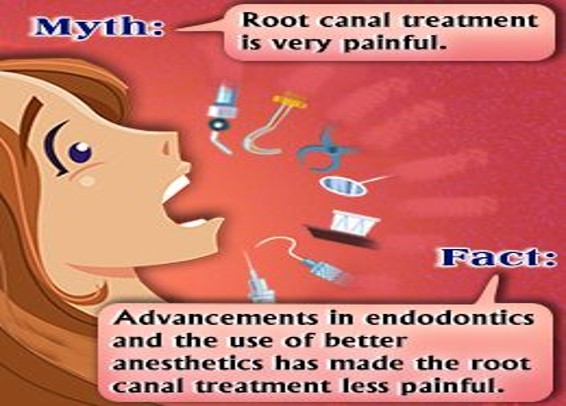
How much does a root canal treatment cost?
The cost varies depending on how complex the problem is and which tooth is affected. Molars are more difficult to treat; the fee is usually more.Generally, endodontic treatment and restoration of the natural tooth are less expensive than the alternative of having the tooth extracted. An extracted tooth must be replaced with an implant or bridge to restore chewing function and prevent adjacent teeth from shifting.
I am sure you see dentists charging ridiculously cheap prices for root canal treatment. But they lack the expertise, skill and technology to do precise and pain-free single-sitting treatments like Dr Naik. Many of these poorly done treatments require repeat treatment in a few years and might even result in you having to extract the tooth! So choose Crowns & Roots for the expertise of Dr Janhavi Naik and for the best quality painless single-sitting root canal treatments in Nagpur!
DENTISTRY IS NOT EXPENSIVE….NEGLECT IS!
